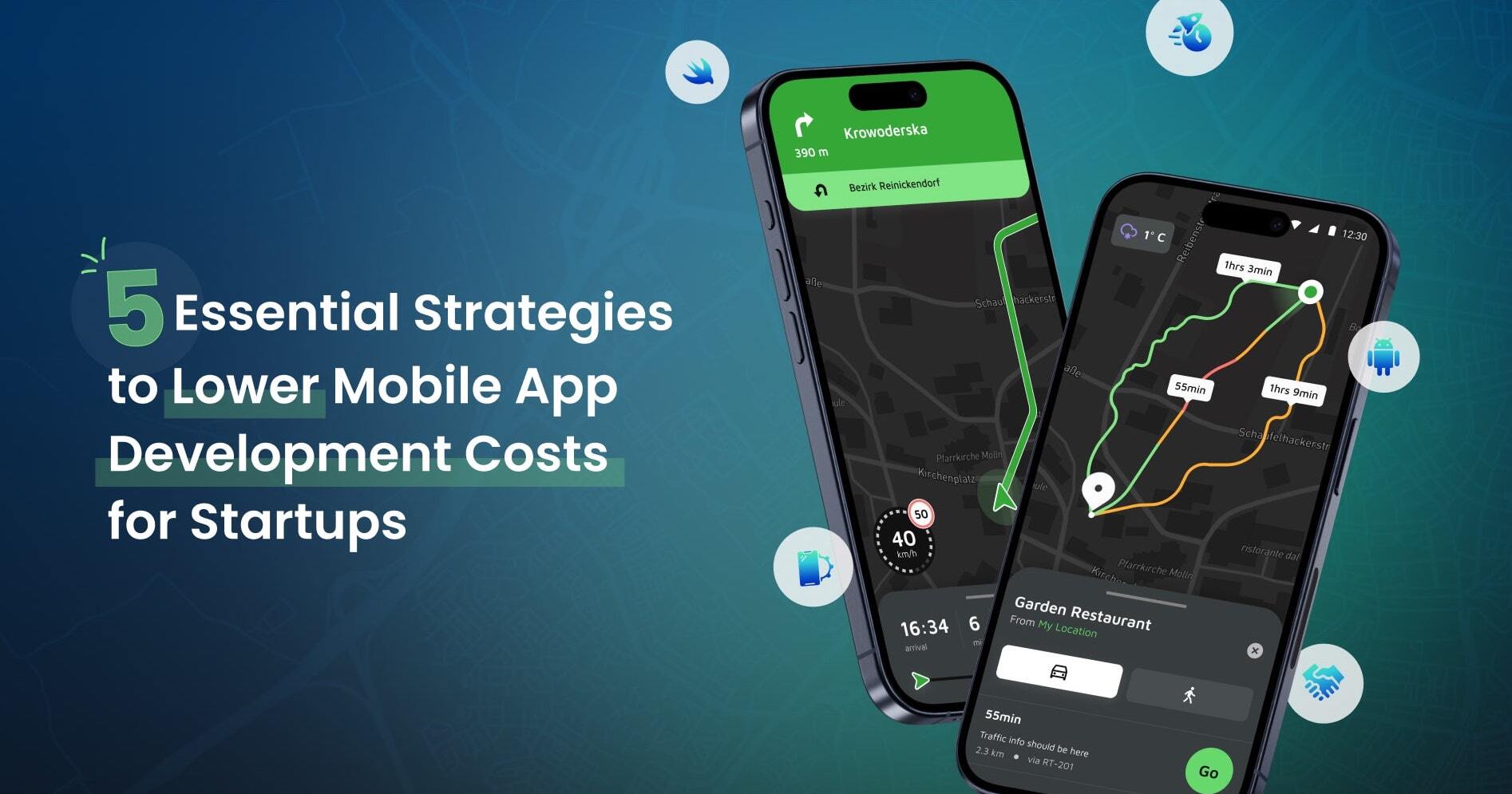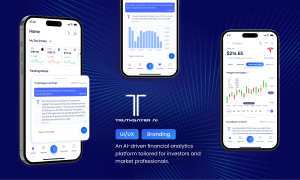As of October 2024, mobile devices account for approximately 67.5% of global web traffic, while desktop usage makes up around 28.9%, with the remaining traffic attributed to tablets and other devices. Given such realities and trends, startups now rely heavily on mobile applications in order to boost customer engagement, offer the most convenient and seamless experience, and raise brand awareness. However, they encounter barriers on the way to this goal. One of the major obstacles is the cost of mobile app development. It might require quite an investment but startups can reduce software development costs without sacrificing quality.
With an understanding of various aspects that shape the mobile app cost as well as strategies to lower expenses, startups can make the most of their budget and enter the market with an advanced product that meets user needs.
In this guide, we’ll uncover 5 effective strategies that help startups lower app development cost while ensuring high product quality.
What are the costs of custom mobile app development for startups?
Developing a mobile app should never be overlooked, even for businesses operating on a limited budget that plan to start with a streamlined version and expand features as their resources and user base grow.
When startups are just about to embark on this journey, the very first question they have is “how much does it cost to make an app from scratch?” worried about seeing a multi-digit number that they cannot afford to cover.
The cost of mobile app development depends on several underlying factors; and the more complex your project is based on them, the higher the price. In 2024, the average app development cost varies in the following range:
- Simple Apps: These apps with basic functionality (e.g., calculators or flashlights) typically cost between $5,000 and $50,000 and take 2-3 months to develop.
- Moderate Apps: Apps with more advanced features like social media or fitness tracking range from $50,000 to $120,000 and take 3-9 months.
- Complex Apps: High-functionality apps (e.g., gaming, e-commerce, or integrations with multiple services) range from $100,000 to $300,000+ and may take over 10 months to develop
However, to get a precise estimate and make your investment wise and effective, it’s necessary to understand and consider multiple critical factors shaping the overall price.
Key factors driving mobile app development cost
When it comes to calculating the mobile app development price, several parameters must be considered to avoid cost overruns and make well-informed decisions. To manage budgets more effectively, startups need to carefully evaluate each factor and set priorities. Here’s the breakdown of the key aspects driving mobile product development costs.
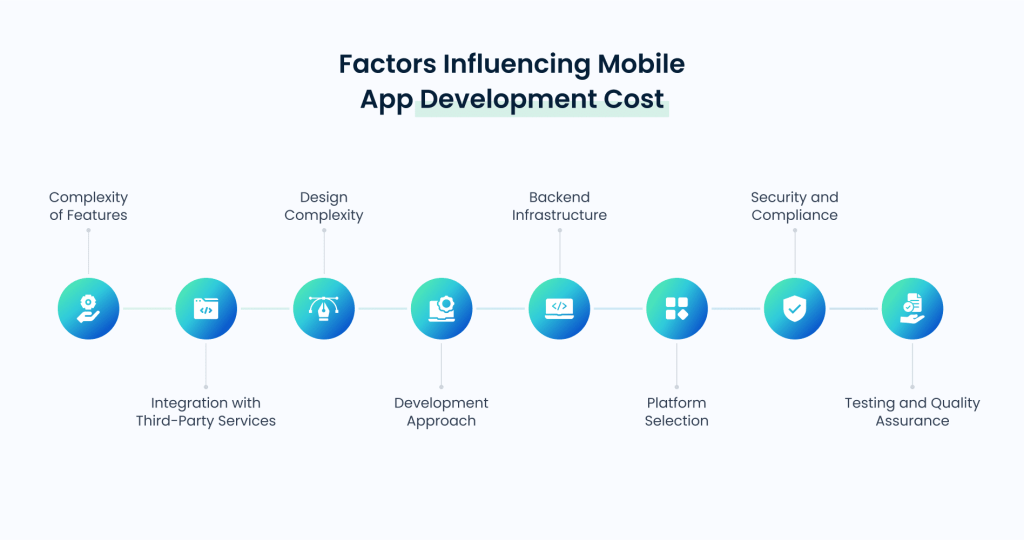
App complexity
A simple mobile app will save you money and reduce development time while a more complex solution with a full pack of advanced features will require more resources. This goes down to the amount of features you plan to include, the complexity of business logic, top-tier technologies integration, and the number of screens, buttons, and functions the app will have.
App type
Mobile applications are divided into three categories: native, web, and hybrid. Each type has unique needs, business logic, and features and requires a particular development approach.
To develop native applications, programmers utilize languages specifically designed for Android or iOS. Maintaining the code for these apps can be resource-intensive, as a unique codebase is required for each platform.
Web apps offer ease of maintenance, as the same codebase can serve all platforms. These solutions are accessed directly online, eliminating the need for app store distribution which makes them a cost-effective option for projects with minimal resource demands or performance requirements.
Hybrid apps, combining elements of both web and native app technologies, strike a balance by using a single codebase across multiple platforms. This, however, makes maintenance moderately challenging compared to fully native apps. They are ideal for applications that require full device access without needing top-tier performance.
At Pecode, we specialize in matching varying requirements. Explore our experience through the recent mobile app development case study.
Scope and features
The more sophisticated features you want, the more time and money you will have to spend. Advanced functionalities such as real-time messaging, GPS, payment gateways, or AI can increase costs significantly as well as adding in-app purchases or e-commerce functionality. The usual development cycle can be extended because features are introduced incrementally over time.
UI/UX design
App design can significantly add to the overall product price yet it must be prioritized – a well-executed UI/UX design is the key to drawing users’ attention and keeping them engaged. Startups should first decide whether they can make it with a standard UI, that is cheaper, or they prefer a custom one that comes at a higher price. Prototyping, user testing, interface and user experience details, branding design, and UX writing altogether result in additional expenses.
Platform
While Android and iOS apps are quite similar in terms of price, creating an application that works simultaneously on both platforms is more expensive. This requires separate front-end development due to different programming languages (Java for Android, Swift/Objective-C for iOS), though the back end is usually shared. To save time and costs, cross-platform frameworks like React Native allow developers to write a single codebase for both platforms, cutting front-end expenses significantly.
Backend infrastructure
Server-related expenses arise when apps need backend functionality for features like data storage, user authentication, or real-time updates. The more complex and extensive the backend, the higher the costs. Similarly, incorporating third-party APIs for services like payments, social media, or geolocation increases development time and adds to the budget.
Compliance and security
Ensuring data protection, user privacy, and compliance with regulations (like GDPR or HIPAA) is vital though it needs extra costs related to encryption, secure data storage, and regular security audits.
Maintenance and updates
The development team’s work doesn’t stop once an app goes live – it continues with ongoing maintenance, bug fixes, and updates. Post-launch support is essential to keep the app functional, competitive, and up to the changing trends. This also includes tracking and incorporating user feedback to address issues that encounter and hinder user experience. This aspect must never be overlooked though it causes ongoing expenses.
Team’s location and type of collaboration
The cost for mobile app development is affected not only by technical factors, but also by the geographical location of the development team, their expertise and experience, and the type of cooperation. As labor costs vary globally, hourly rates is an important factor to consider when choosing a team to collaborate with. The average cost of an app also depends on how experienced and skillful the team is. Simply put, hiring specialists with the required technical expertise can be more challenging and come at a higher cost.
Talking about the type of collaboration, building an internal team, hiring freelancers, or partnering with an outsourcing company – all options have their pros and cons and, ultimately, different prices.
Proven methods to optimize app development costs
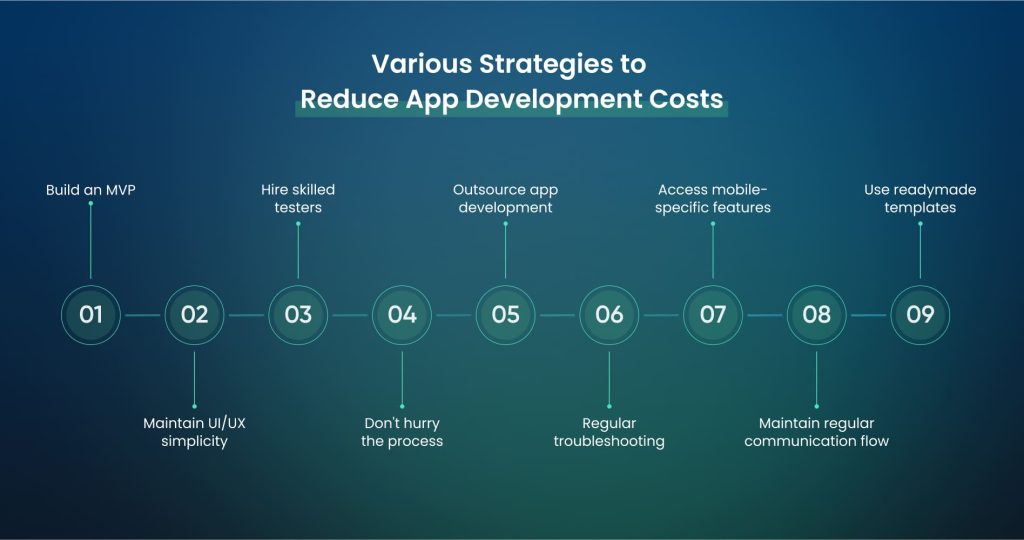
Startups are struggling to fit into their budgets without losing on their products’ quality. Tackling this task is challenging yet possible if the proven strategies are implemented properly. Though it’s unrealistic to cut the price in two, there are some actionable steps to reduce the cost of mobile app development for startups.
After all, creating a successful app is far more than just making huge investments – it’s equally about thoughtful planning and efficient implementation.
Choose a minimum viable product (MVP) approach
Start small, with an MVP, and scale up step by step. Rank features by their priority and impact on user experience, implement the most essential first, and then gradually add the rest in regular updates. This approach allows startups to get to the market quickly, collect user feedback, and, based on it, improve the app in iterations thus minimizing the initial product development cost. The profits gained with an MVP can be further invested in advanced features that truly resonate with users.
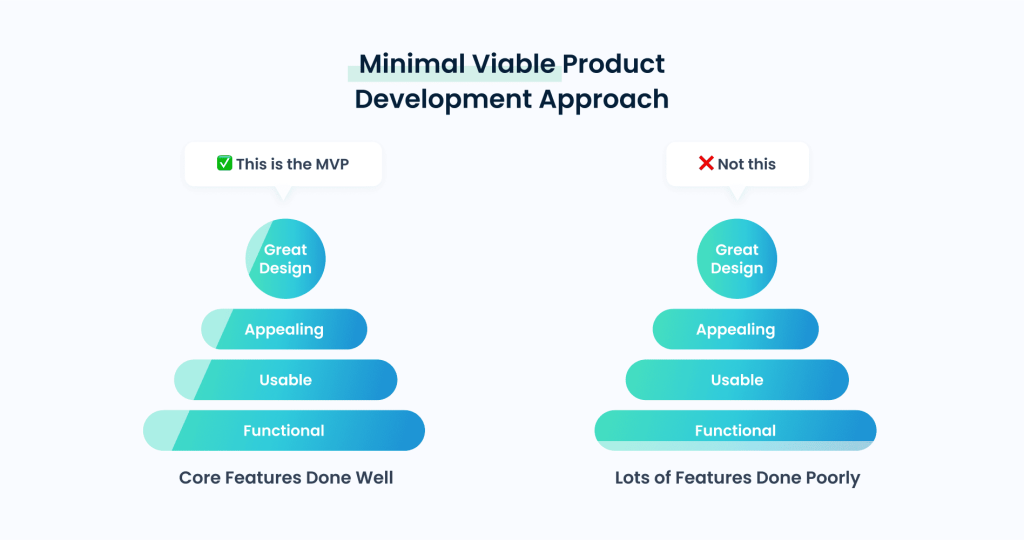
Opt for cross-platform development
As the market sees an increase in devices across various platforms, ensuring your app delivers consistent performance on all becomes essential. But building separate apps for each platform is too resource-consuming and might end up going beyond the budget. Driven by code-reusability, platform portability, and quick development time, the cross-platform approach is a cost-effective solution that allows for creating apps that run seamlessly on multiple platforms. Startups can cut the mobile app development price while still providing an exceptional user experience to a broader audience.
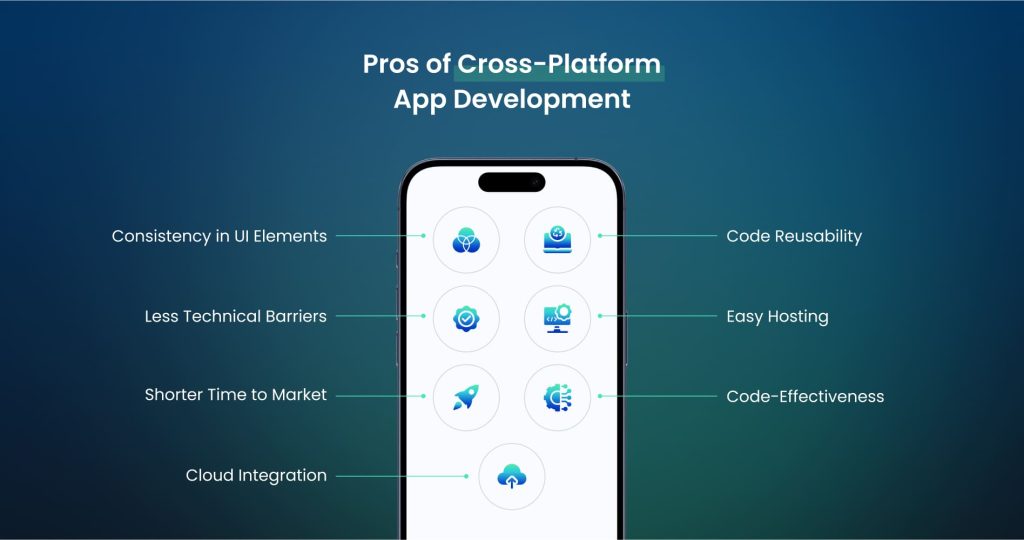
Outsource development to experienced teams
Outsourcing app development is definitely a win-win option for startups compared to assembling a full in-house team. This method provides access to the global pool of best app developers for startups and cuts down on operational and labor costs typically associated with maintaining a full-scale team. Besides, companies can reach out to seasoned developers from regions with lower hourly rates and reduce software development costs without compromising quality.
Get tips on how to choose the right outsourcing partner for your startup: https://pecodesoftware.com/blog/choosing-the-right-outsourcing-partner-key-considerations/
Focus on clear and detailed project documentation
Creating precise and thorough project documentation is also quite effective for lowering the app development price. This minimizes misunderstandings and ensures everyone is aligned on the project scope, features, and goals. A well-documented plan reduces the likelihood of costly revisions or scope creep during the development cycle. It must include detailed project requirements and scope, technical specifications, design guidelines, realistic timelines and milestones, and budget constraints. With effective project management and regular communication, teams can avoid unmet demands, delays, and cost overruns.
Adopt agile development methodologies
Implement agile practices, such as iterative development, continuous feedback, and flexible planning, to manage the process better and ensure the project stays on track and within budget. Working in small sprints makes it easier for teams to pivot once the market or user requirements change. As issues are fixed immediately, the risk of costly reworks in post-release is considerably lower. Agile development is all about flexibility, responsiveness, and more effective resource allocation.
Wrapping up: building an app on a startup budget
Developing a feature-rich and user-friendly mobile app from scratch is an intricate journey for startups that they, however, cannot walk by. It takes a lot of resources to launch an app that will stand out and bring the expected value to both businesses and users.
Often limited in budget, startups look for optimal methods to achieve a cost-quality balance. Reducing app development costs doesn’t mean giving up on the solution’s quality or taking shortcuts – It’s about finding the right mix between cost-saving measures and strategically investing in elements that enhance quality and improve the user experience. With mindful planning and proper implementation of the strategies mentioned above, emerging businesses can cut unnecessary expenses, streamline development, and build a competitive app within their budget constraints.
Last but not least, getting backed by a seasoned partner with hands-on experience in mobile app development for startups will definitely make this journey smoother and less stressful.
Pecode can become more than just your development team; we can be your reliable partner and experienced advisor. Our team offers advanced development services as well as guidance through all the complexities of mobile app development while sticking to your requirements and constraints.
At Pecode, we’re committed to supporting promising and ambitious startups and helping them bring smart ideas to life.
Contact us via info@pecodesoftware.com and let’s develop a top-notch mobile app together!
